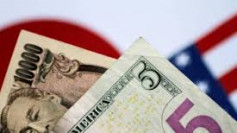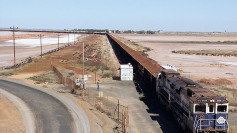The Japanese yen experienced a sudden surge against the U.S. dollar on Monday, with traders citing suspected intervention by Japanese authorities to support the currency, which has been languishing at levels last seen over three decades ago. The dollar fell sharply to a low of 154.40 yen from as high as 160.245 earlier in the day, with banking sources reporting Japanese banks selling dollars for yen.
Traders had been anticipating signs of action from Tokyo to prop up the yen, which has fallen 11% against the dollar so far this year, despite the Bank of Japan's (BOJ) historic exit from negative interest rates last month. Currency traders have bet that Japanese rates will remain low compared to relatively high U.S. interest rates, contributing to the yen's weakness.
While Japan's top currency diplomat, Masato Kanda, declined to comment on the suspected intervention, he described the current developments in the currency market as "speculative, rapid and abnormal," stating that they could not be overlooked. Nicholas Chia, Asia macro strategist at Standard Chartered Bank in Singapore, believes that if the move represents intervention by the authorities, it is unlikely to be a one-time occurrence, and further action can be expected if the dollar/yen pair reaches 160 again.
The yen's weakness has been a boon for Japanese exporters but a headache for policymakers, as it increases import costs, adds to inflationary pressures, and squeezes households. BOJ Governor Kazuo Ueda stated in a press conference last week that monetary policy does not directly target currency rates, although exchange-rate volatility could have a significant economic impact.
Experts have noted that Japanese officials seem more focused on volatility in the currency rather than specific levels. Frederic Neumann, HSBC's chief Asia economist and co-head of global research in Asia, said that if the yen sees a "steady depreciation," there might not be much resistance from Japanese authorities. However, Jesper Koll, expert director at investment advisory firm Monex Group, predicted that officials would take action if the yen moves more than 3-5 yen in 12 hours, indicating a genuine speculative attack.
The suspected intervention occurred days ahead of the Federal Reserve's policy review on May 1, with expectations for Fed rate cuts being pushed back as U.S. inflation remained elevated. This suggests that intervention alone may not be effective in putting a floor under the yen, and a combination of BOJ demonstrating urgency to normalize policy and the Ministry of Finance conducting currency intervention might be more effective, according to Christopher Wong, currency strategist at OCBC in Singapore.
Japan intervened in the currency market three times in 2022, selling the dollar to buy yen, with an estimated $60 billion spent defending the currency at that time. The United States, Japan, and South Korea have agreed to "consult closely" on currency markets, and Tokyo has stepped up its rhetoric against excessive yen moves.
Despite the yen's weakness, T. Rowe Price's Vincent Chung noted that it has "positively impacted stock performance, encouraged corporations to raise wages, and moved the country closer to the Bank of Japan's inflation target of 2%."






